

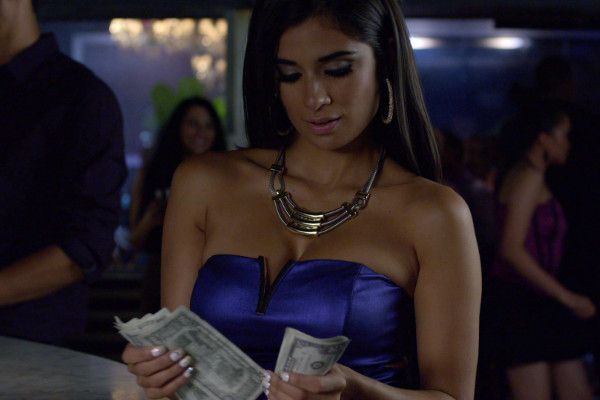
One of the most sexual episodes of the season, as the flashbacks not only centre around Maritza using her sexual appeal to steal cars, but multiple extras fill out the shower scenes in various states of undress. Add to this the new guards lusting after the female prisoners and Litchfield has become a very threatening, claustrophobic place.
If viewers were watching the fourth season episodes without any prior knowledge of the programme, it's doubtful they'd be able to pick out Piper as the lead character. Not only is she now well pushed down into the ensemble, but as a real person with genuine motivations she's scarcely believable. Now no longer effective as an audience identification figure, she's completely immersed in egotism and power, yet without any serious motivation beyond the comic.
While it's highly unlikely she'd seriously think of herself as the prison's "top dog", this instalment sees her go even further, setting up what is basically a snitch movement in a tough prison. Such an unlikely step does, nevertheless, bring about the amusing twist that she's unwittingly started a far-right group. Thankfully Piper's character is brought back into a more recognisable form in later episodes.

Although the flashback story here is Brook's past, and the present explores the relationship between her and Poussey, most of these episodes are hard to rate individually as they all tell varying plotlines as part of an ongoing narrative, almost indistinct from one another as separate instalments. Consequently while the top three or four episodes may be a cut above the rest (and the bottom three or four a notch below), the quality is largely consistent throughout, and many of these episodes could be ranked in any order.
The large number of new cast members does cause some of the older characters to get less screentime (Sophia particularly), but one inmate who gets an increased profile is Frieda (Dale Soules). Involved in covering up the murder of the hitman, her final, left-field statement at the end of this episode is a delight, delivered with pure matter-of-fact coldness.
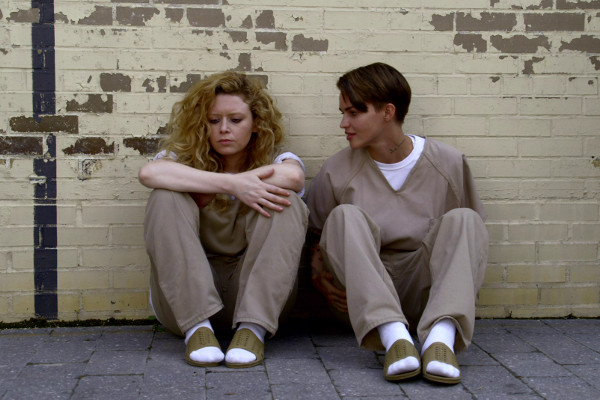
Piece of Shit sees the welcome return of Natasha Lyonne as the popular Nichols, a revelation that had been teased with a cameo in episode four (and ruined by the actress getting a credit in the first three episodes where she doesn't appear). Although the plotlines are divergent, three of them do have a thematic resonance in that they depict sex as a trade: Nichols and Luschek (Matt Peters) both have to perform sex in return for differing exchanges, while Poussey has problems with Brook, who, while in a consentual relationship, doesn't wish to return her sexual favours. This last element does contradict events in season two, where Nichols forced Brook to go down on her as a means of shutting her up. Possibly the experience of being roughly pushed put Brook off the experience, but it means that OITNB remains that rarest of programmes... a TV series that has a continuity error based solely around cunnilingus.
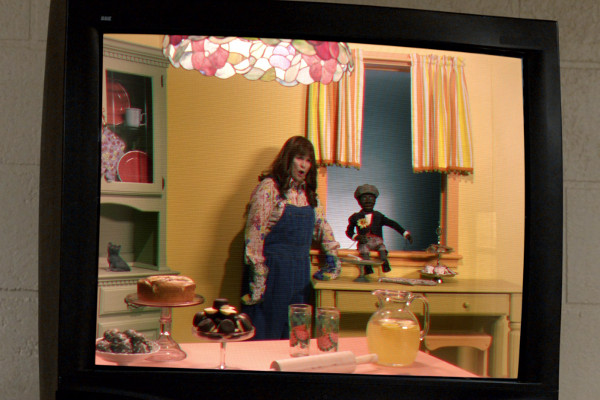
Nick Jones was a co-producer of Orange is the New Black in 2015, wrote half a dozen episodes and script-edited a dozen more. For this season he not only comes back to write two episodes (including this one) and becomes a producer, but here he makes the first of two appearances as the puppeteer of "Chitlin' Joe".
The backstory goes to Lolly, and, instead of getting the actors to wear wigs or hair dye, as has been done in the past, Christina Brucato takes on the character of Lolly as a young adult. Many child versions of the characters have been brought to life in the series, but this is Lolly in her early 20s. Brucato actually does very well in the part, but Lori Petty is perhaps too familiar an actress to successfully replicate.
The series does sometimes reference sci-fi TV, including a couple of Star Trek references in early episodes, probably as an in-joke for Kate Mulgrew. Here Nichols gives us the line "I feel like I'm in an episode of The Twilight Zone." The final scenes, with Piper being branded, may be distressing to some viewers.
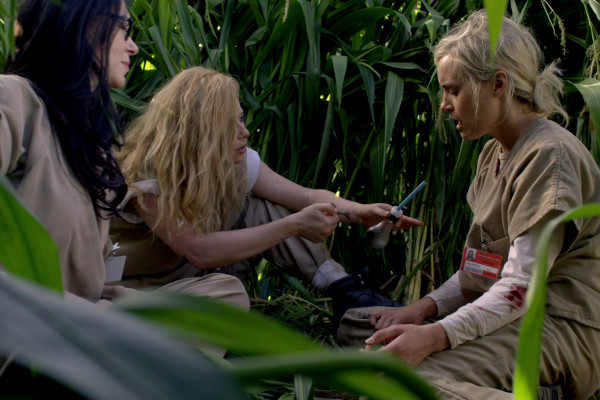
Confidences are finally traded, as Piper and Alex share their secrets, and Piper comes to terms with the consequences of her actions. Taylor Schilling does a fine job as the nominal lead of the programme, but the series often forces her character to fit to the plot, acting inconsistently in a way few, if any, of the other characters do. It doesn't help that the earlier "Piper thinks she's gangsta" scenes were amped up for broad laughs, giving her fall from grace no consistent through line. Regardless, it's nice to see the recognisable character return in this episode, over halfway through the season.
The best Orange Is The New Black episodes have a filmic quality with solid, often obscure, music choices for the closing credits, and season four is particularly strong with its track selection. This one sees Red's brilliantly philosophical "When God gives you a swastika, he opens a window. And then you remember... there is no God" get an encore with Hoagy Lands' 1960 track "Lighted Windows".
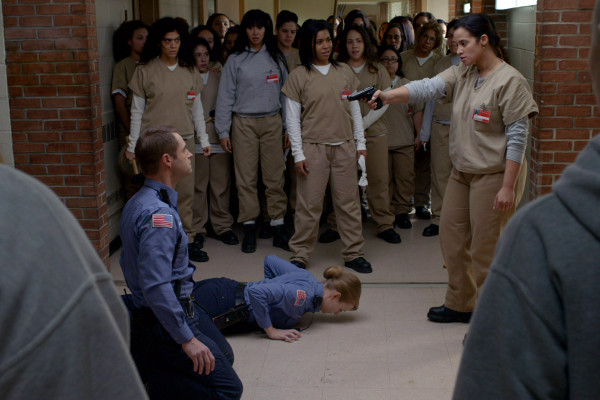
The series continues its tradition of ending with a feature-length episode. Begun in season two, where the many varied plotlines warranted a 92 minute special, it seemed an indulgence when the lightweight season three took 88 minutes to wrap up its somewhat simplistic storylines. Season four does warrant the indulgence of a special length episode, although it's reduced to 77 minutes here and contains some justified padding to take it past the standard hour length. That padding concerns a certain character who gets to go beyond the metatextual self-reflexivity of the series and deservedly gets to break the fourth wall.
Although the series isn't perhaps quite as sharp and tightly-plotted as it used to be in the first couple of seasons, this is a massive return to form after the weak season three, and the show still touches on interconnected life ironies like the notion of two characters who are vital to one another happening by chance to pass each other in the street during the flashback. Unusually for a final episode it's more of an aftermath than a conclusion, with many of the plot lines having finished in the 12th episode, yet the final few minutes do take elements up further in order to make anticipating a fifth season a very real prospect.
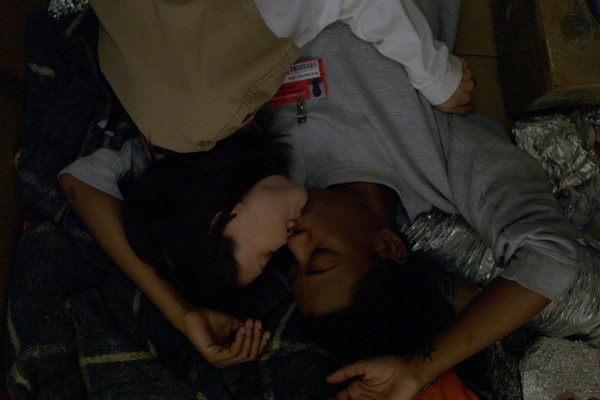
One of the most extraordinary flashback sequences occurs right at the start of this penultimate season four episode, where officer Baxter Bayley is seen as an eighteen-year-old, trespassing onto Lichfield property out of curiosity. Although actor Alan Aisenberg is youthful-looking and is still only 23-years-old (and was 22 when it was filmed), it's an incredibly effective transformation.
However, the real big talking point of this episode is an event that's been alluded to in press releases and on Twitter by some members of the cast. As this guide aims to be as reasonably spoiler free as possible, further details won't be given here, but suffice it say that when this episode ends, there won't be a dry eye in the house. In a very strong season, episode 12 is the high point... but for reasons which can't be talked about. Watch the whole lot on Netflix and see for yourselves one of the best shows on TV right now.